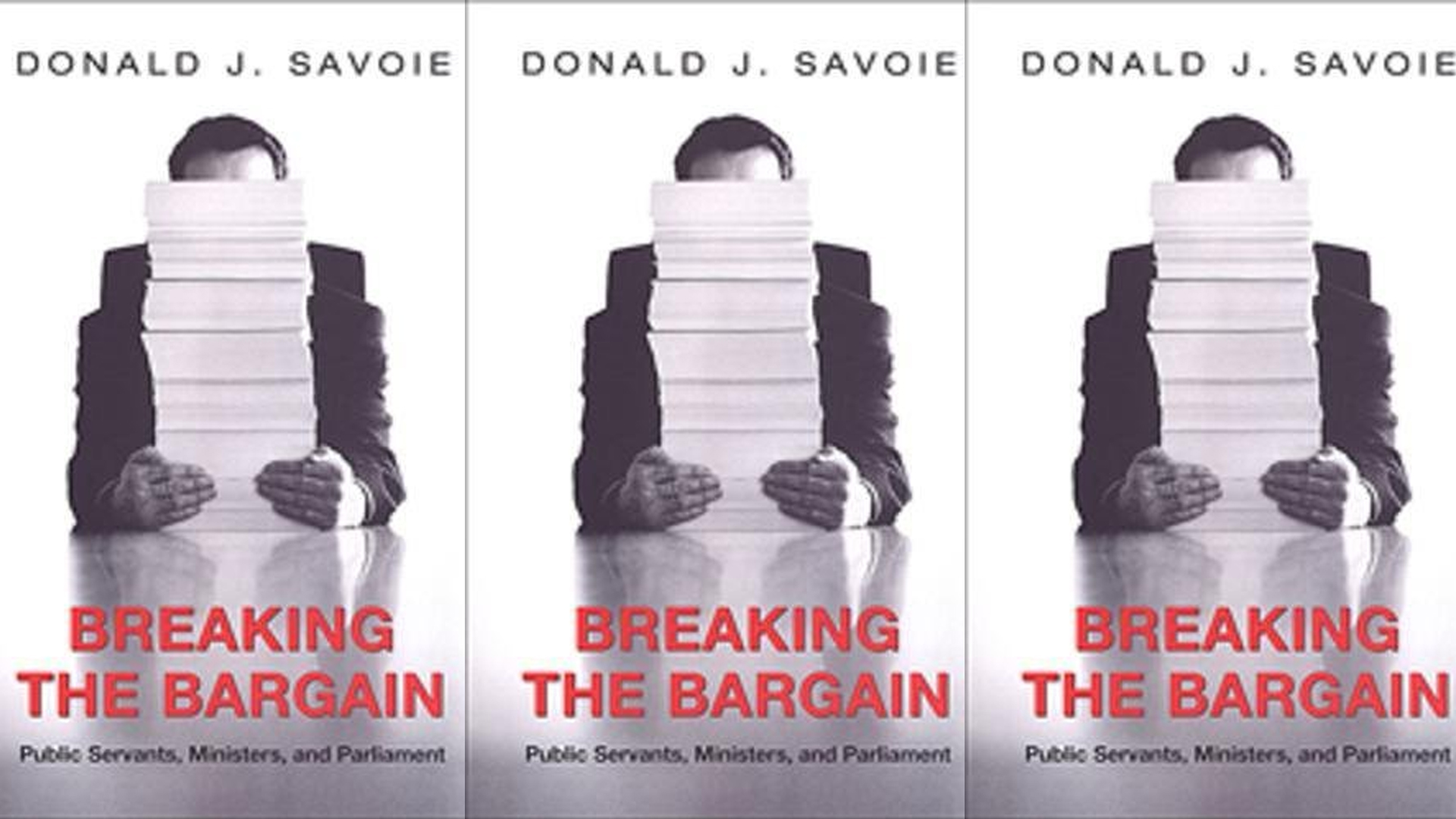
Donald Savoie has been doing a service to Canada in his series of books on administrators and politicians. Building on his Governing from the Centre, which examined central agencies, Breaking the Bargain concentrates on the evolving relationships between politicians and public servants. As the title implies, what he finds is disturbing. He argues that in the past an implied bargain between politicians and the public service allowed the public service to be anonymous, politically neutral, experienced, and competent in policy areas, and also highly respected by both politicians and the public. Public servants could be forthright and candid in their advice to ministers. This has changed to a more complex and less satisfying state in which public servants have lost much of their anonymity, their intimate experience with the departments that they come to lead and even much of their capacity to be candid in their advice to politicians.
Thirty years ago, according to Savoie:
career officials were able to advise ministers in relative secrecy. Today, access-to-information legislation, less deferential and more aggressive media, and e-government have opened up policy and decision-making processes. Thirty years ago, hierarchy shaped policy-making, which was guided by deputy ministers who had an intimate knowledge of their departments, having come up through their ranks. Today, policy-making is…much more an interdepartmental affair, with outside groups brought in to inform new measures and to legitimize the policy process. In addition, public servants have become policy actors outside of government circles.
Back then, politicians and public servants occupied distinct realms. These overlap today, and ministers sometimes blame public servants for errors, rather than accepting the blame themselves as the doctrine of ministerial responsibility would demand.
Savoie’s close look at the community of deputy ministers forms one of the most interesting parts of the book. Deputy ministers stand at the peak of the public service pyramid. They serve as the link between the political sphere and the administrative, and on them lie challenging responsibilities in both administration and policy-making. Savoie traces the changes in the composition of the deputy-minister community from senior persons who had served for a long time in one department and were well-versed in its policies, administration, and functions, to younger persons with less experience in the public service who might not have had previous experience in their department.
Nowadays, he reports, deputy ministers in Canada are younger, less experienced, and stay a shorter time in office than their counterparts in other Western democracies. Perhaps even more important, in the past the closest relationships of deputies were with their departmental ministers and departments; after that came dealings with central agencies and other deputy ministers. This has been reversed. Now deputy ministers spend more time networking and negotiating than they do in departmental administration, and nearly twice as much time in meetings with their peers as with their own ministers. Policies now come less out of individual departments and more out of the community of deputy ministers. Success demands the ”horizontal” cooperation and support of many departments, and the successful deputies are those who can handle the system, not those who are experts in particular policy areas. Here Savoie identifies a key paradox of the present system: the focus at the most senior levels of the public service is on policy-making, not administration, but the most senior public servants are experts on networking and manipulating the system, not on the policy issues facing their departments. Savoie expresses justifiable concern about the growing reliance of departments on outside consultants, interest groups, and think-tanks for providing substantive advice on policies. I am left wondering if the change was inevitable or if we have failed to strengthen the policy-making capacities of departments and senior public servants, and if the net result has not been an increasing responsiveness to particular interests, as expressed by these outside bodies, at the expense of the identification of a more general public interest by the public service and government, with their quite different and broader obligation to respond to the needs of Canadians as a whole.
These changes in the role of the deputy ministers have occurred in an environment of constant reform which began with the Glassco Commission in the early 1960s and hasn’t stopped yet. Reform’s main thrust has been to make government more ”business like.” Departments now have, inter alia, ”business lines,” ”partnerships,” and ”clients.” Savoie shares my skepticism about whether this sort of terminology is useful or accurately describes government and its role. For example: Who are, and should be, the proper clients of a regulatory agency or such bodies as a food inspection service ”” the private bodies being regulated or inspected or the public at large? His conclusion is damning, and I fully agree with it: ”Past reform efforts have been built on fantasies rather than theories,” and ”the introduction of the business management model to government operations has been a failure.” New public management, which to paraphrase Voltaire was neither new nor public nor management, has a lot to answer for. Many aspects of business type administrative practices simply do not work in a parliamentary setting, where ministerial responsibility and direct answerability of ministers in Parliament remain key to accountability and leadership.
There are many more themes in this rich book, including questions on the lowering of public respect for government, politicians, and public servants, and the problems of nontraditional forms of organization in government ”” what J.E. Hodgetts years ago described as ”structural heretics.” Savoie’s discussion of these is perceptive, and each issue he raises deserves extended research and discussion. The environment, practices and notions about political and public service have changed and are still changing. If, as a country, we want to control our destiny, we need to look closely at these very real problems.
Savoie proposes two reforms. First is the introduction of the British ”accounting officer” concept, in which the departmental accounting officers, the deputy ministers, would bear full and personal responsibility for prudence and probity in expenditures unless they are explicitly overruled in writing by their minister. This reform was proposed by, among others, the Lambert Commission on Financial Management and Accountability, the McGrath Committee on Reform of the House of Commons, and numerous other observers. It has the advantage of clarifying the boundary between the political and administrative spheres, and ensuring that when decisions are based on criteria other than ”value for money” the responsibility lies clearly with the appropriate decision-maker ”” whether politician or public servant. To add to Savoie’s discussion, it is worth pointing out that the federal Financial Administration Act allows the Treasury Board to delegate the power to make expenditures to deputy ministers, but not to ministers. Therein lies the problem. The sole statutory change required to create the position of accounting officers is to amend the Financial Administration Act to permit ministers to overrule their deputies, and to ensure that these overrulings are considered by Parliament. This would clarify and strengthen both ministerial and deputy-ministerial responsibility and accountability.
I have less confidence in Savoie’s proposal to create a committee of the House of Commons on the public service, in large part because I have less confidence than he in parliamentary committees. Evidence from efforts to reform parliamentary committees over the past 35 years gives no glimmer of hope that a committee of the House of Commons can work consistently and constructively on a topic like the public service. Quite the opposite, the government operations committee’s recent haring off after the expenses of an outstanding governor general, when it might have tackled serious issues like the role of central agencies or public service reform, shows that a possible scandal, no matter how trivial, has more appeal to parliamentarians than useful but less newsworthy work.
Savoie claims that there was a golden age, and frequently refers longingly back to a time in the mid-twentieth century before the bargain had been broken. It is a common human tendency to believe we live in an age of decline. T.S. Eliot believed so, as before him (going back only four centuries) did Matthew Arnold, Swift, and Shakespeare. This tendency justifies dismay and revulsion at the confusion and ugliness of our own times. But I believe the bargain was never anything more than an ideal in Canada. John Diefenbaker came to power forty-six years ago, and governed for six years with a deep mistrust of the civil service. Much of his distrust was justified. The civil service had cohabited and grown with a Liberal government for 22 vital and formative years. Every day in the Commons Diefenbaker faced ex-civil servants turned politicians on the Liberal opposition front bench. The fact of a long-lived and dominant ”Government Party” in Canada makes the opposition mistrustful of the government and its works. This mistrust colours the Opposition’s views of the public service and makes adversarial combat, scandal hunting, and the attack and defend mode of parliamentary combat the core of parliamentary discussion of the public service, as of most other issues. It would be wishful thinking to expect these defining features of the structures of political power in Canada to change.









